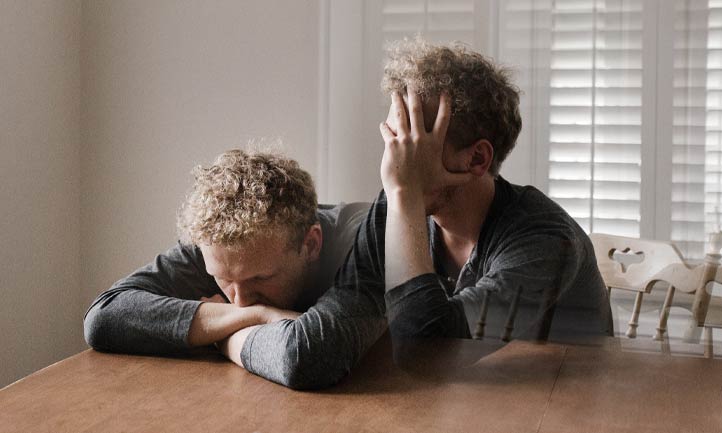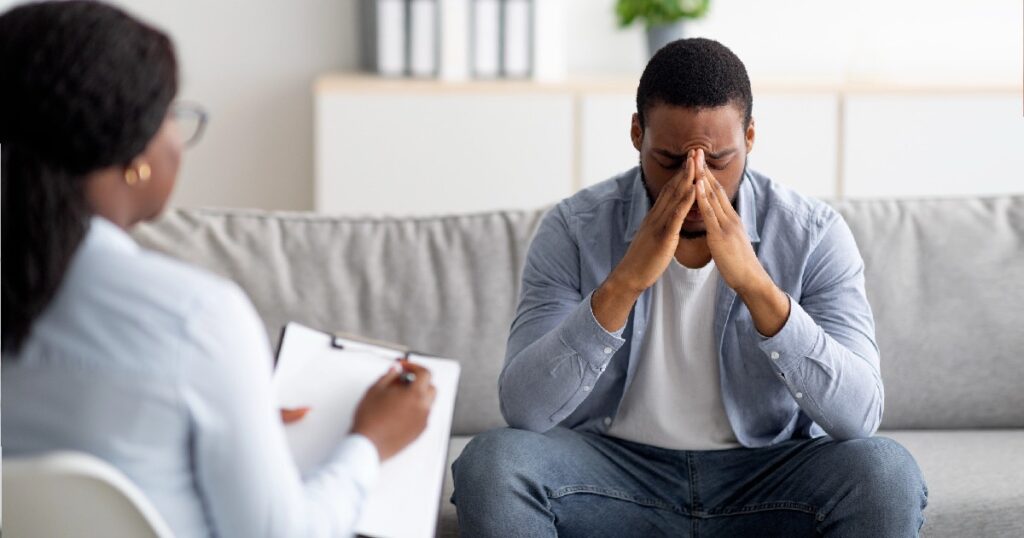How to Convince Your Parents About Taking Therapy in India

How to Convince Your Parents About Taking Therapy in India Struggling to talk to your parents about therapy in India? Learn practical tips to overcome stigma, explain the benefits of counselling, and make mental health conversations easier with PsyQuench Introduction Talking to parents about therapy can feel like one of the hardest conversations in an Indian household. For many young people, the hesitation doesn’t come from their own belief in therapy, but from the stigma, myths, and generational differences that surround mental health in India. Parents often grew up in a cultural environment where therapy was seen as unnecessary, shameful, or only for people with “serious mental illness.” But times are changing. With rising awareness, increasing stress levels, and more accessible mental health services, therapy is becoming a normal and essential tool for wellbeing. Still, for students and young adults, convincing parents to support their decision to seek therapy can be challenging. This guide explores why Indian parents may resist the idea, and offers practical strategies to help you approach the conversation with empathy, clarity, and confidence. Why Parents in India Resist Therapy 1. Stigma and Cultural Beliefs In India, mental health issues have long been surrounded by stigma. For many parents, the idea of therapy is tied to “madness,” weakness, or family shame. This leads them to dismiss therapy as unnecessary, even when their child is struggling. 2. Lack of Awareness Most parents did not grow up with access to therapy. They may not understand how counselling works or the role of psychologists. Without knowledge, fear and skepticism naturally follow. 3. Generational Gap For many Indian parents, hardships were endured without professional support. They may believe in “toughening up” or relying solely on family, friends, or spirituality. Therapy, therefore, can feel foreign or unnecessary to them. 4. Financial Concerns The cost of therapy in India is another barrier. Parents may see it as an “extra expense” instead of an investment in wellbeing. 5. Fear of Judgment Some parents fear what relatives, neighbors, or community members will say if they discover their child is in therapy. This external pressure can deepen resistance. Steps to Convince Your Parents About Therapy 1. Educate Yourself First Before you start the conversation, understand therapy well enough to explain it in simple terms. Learn about: This will help you answer your parents’ questions with clarity. 2. Pick the Right Time Choose a calm, private moment when your parents are receptive. Avoid raising the topic during arguments, stressful situations, or family gatherings. 3. Start with Feelings, Not Labels Instead of saying, “I need therapy because I have depression,” you could say: This focuses the conversation on your experience rather than mental health labels that may alarm them. 4. Normalize Therapy with Examples Give them relatable examples: You can also share articles, videos, or resources that highlight therapy’s role in India. 5. Address Stigma Directly If parents say, “What will people think?” you can respond: Showing confidence helps reduce their fear of judgment. 6. Offer Reassurance Parents often worry that therapy means something “serious.” Reassure them that therapy is not only for crises, it can be preventive and supportive. 7. Highlight the Practical Benefits Explain how therapy can help with: Connecting therapy to real-life outcomes can make it more acceptable. 8. Share Stories and Success Cases Parents may trust real stories more than abstract explanations. Share examples of public figures, friends, or community members who benefitted from therapy. 9. Involve Them in the Process If they remain unsure, suggest: Involvement helps reduce their anxiety about the unknown. 10. Take Small Steps Sometimes, parents won’t agree immediately. Keep the conversation open, show consistency in your need, and allow time for them to adjust. The Role of Cultural Sensitivity in Therapy Indian parents value culture, traditions, and family deeply. When looking for therapy, you may want to seek therapists who are culturally aware and can bridge the gap between modern counselling practices and Indian family realities. Platforms like PsyQuench Counselling Services offer access to trained therapists who understand Indian contexts, from family dynamics to academic pressures. Cost and Accessibility Parents may be more open if therapy feels accessible and affordable. Options include: Breaking the Stigma Together Convincing parents is not just about your own therapy journey — it’s about starting a broader shift in how mental health is viewed in Indian families. By having these conversations, you’re helping normalize therapy for future generations. For additional perspective, you can also refer to the Ministry of Health and Family Welfare’s Mental Health Programme which acknowledges the importance of mental health services in India. Summary Convincing parents about therapy in India can be challenging due to stigma, generational differences, financial concerns, and lack of awareness. However, with empathy, patience, and education, you can create space for understanding. Key steps include: Conclusion While Indian parents may initially resist the idea of therapy, change is possible through open dialogue and persistence. Therapy is not a sign of weakness but a step toward resilience, growth, and wellbeing. By addressing stigma and presenting therapy as a normal, supportive tool, you can encourage your parents to see its value. If you are ready to take the step, platforms like PsyQuench can connect you with experienced counsellors who understand Indian cultural contexts and provide safe, confidential support. Take the step — Let PsyQuench support your journey. FAQs 1. How do I explain therapy to my parents who think it’s only for “serious” problems?You can tell them therapy is like coaching for the mind, it helps with stress, relationships, and decision-making, not just illness. 2. What if my parents refuse to support me?You can still explore online counselling, which gives you independence and privacy. Many therapists offer affordable sessions for students. 3. How do I handle financial barriers if my parents won’t pay?Look for low-cost therapy options, student counsellors, or online platforms offering sliding-scale fees. 4. Is it disrespectful to go to therapy without telling parents?Not at all. Taking care of your mental health is your right. While
Cost of Therapy in India: What You Need to Know

Cost of Therapy in India: What You Need to Know Curious about therapy costs in India? Learn how much counselling sessions typically cost, factors affecting fees, and how to find affordable therapy options. Introduction Mental health is gaining recognition in India like never before. From students struggling with exam stress to working professionals dealing with burnout, more people are opening up to the idea of seeking therapy. But one common question remains, how much does therapy cost in India? The truth is, there isn’t a one-size-fits-all answer. Therapy costs vary based on the therapist’s qualifications, the city you live in, the format of sessions (online vs offline), and the type of therapy you need. In this blog, we will break down the average counselling session fees in India, explore what influences these costs, and guide you toward finding affordable therapy in India without compromising quality. If you are considering therapy, this guide will help you plan financially while making mental health a priority. Average Cost of Therapy in India The cost of therapy in India ranges widely depending on multiple factors. On average: Session length: Most counselling sessions last between 45–60 minutes. Some therapists offer shorter sessions (30 minutes) at a lower cost, especially for follow-ups. It’s important to note that fees can be significantly higher in metro cities like Mumbai, Delhi, and Bangalore compared to smaller towns. Factors That Influence Therapy Costs The cost of therapy in India is shaped by several factors: 1. Therapist’s Qualifications 2. City and Location 3. Mode of Therapy 4. Session Type and Duration 5. Therapist’s Experience Affordable Therapy in India: Is It Possible? Yes, therapy can be affordable — if you know where to look. Here are some options: 1. Online Counselling Platforms Services like PsyQuench Counselling offer structured, affordable therapy sessions with trained professionals across India. Online platforms usually have lower costs compared to traditional clinics. 2. Sliding Scale Fees Some therapists offer sliding scale pricing based on your financial situation. You can ask your therapist if this option is available. 3. Universities and Training Institutes Colleges with psychology programs often have low-cost counselling clinics, run by trainees under supervision. These can be great options for students and individuals with tight budgets. 4. NGOs and Mental Health Helplines Organizations like iCall (TISS Mumbai) and Snehi offer affordable or even free counselling services. 5. Short-Term Therapy Packages Some therapists offer packages for a fixed number of sessions at a reduced cost. This helps in budgeting your therapy journey. Therapy Cost vs. Value: Why It’s Worth It It’s natural to hesitate when looking at counselling session fees in India, especially if you’re unsure how many sessions you’ll need. But think of therapy as an investment in yourself. When compared to expenses like dining out, shopping, or entertainment, therapy is a life-changing investment that pays off in overall well-being. It is also essential for you to know the different types of therapy to understand what works better for you! PsyQuench offers a range of certificate courses for you to choose from. How Many Sessions Do You Need? There’s no fixed answer. Some people feel relief after 4–6 sessions, while others may need months of therapy depending on the concern. Your therapist will guide you after an initial assessment. Remember: Therapy is not a one-time solution but a process. Budgeting for at least 8–10 sessions is often recommended to see meaningful progress. Insurance and Therapy Costs in India A common question is: Does insurance cover therapy in India? The short answer: Yes, but with limitations. Since 2017, the Mental Healthcare Act mandates that insurance providers cover mental health treatment. However: For a detailed guide, you can check our blog on Therapy and Insurance in India. Practical Tips to Manage Therapy Costs Summary The cost of therapy in India varies widely, from ₹500 to ₹5,000 per session, depending on qualifications, location, and type of therapy. While this may seem overwhelming, affordable options exist through online platforms, NGOs, and sliding-scale fees. Therapy should be seen not as an expense but as an investment in mental health and well-being. If you’re looking for affordable and accessible counselling, PsyQuench Therapy Services provide professional support tailored to your needs. Conclusion Mental health is as important as physical health — yet, therapy costs in India often hold people back from seeking help. The reality is that therapy doesn’t always have to be expensive. Whether through online counselling, NGO services, or affordable private sessions, help is available. By understanding the true costs of therapy and exploring your options, you can take the first step toward better mental health without financial stress. Invest in yourself — Find affordable therapy with PsyQuench. FAQs 1. How much does therapy cost in India per session?On average, therapy costs between ₹500 to ₹2,500 per session for counselling psychologists and ₹2,000 to ₹5,000 for clinical psychologists or psychiatrists. 2. Is online therapy cheaper than in-person therapy in India?Yes, online therapy is usually more affordable, with sessions starting as low as ₹500. 3. Can I find free counselling in India?Yes, several NGOs, helplines, and universities offer free or low-cost counselling services. 4. Does insurance cover therapy in India?Some insurance policies cover psychiatric treatment, but coverage for outpatient counselling is still limited. 5. How do I know if a therapist is worth the cost?A good therapist will make you feel heard, respected, and supported. The value lies in improved mental health, relationships, and daily functioning.
Breaking the Stigma: Why Therapy Is Not Just for the ‘Mentally Ill’ in India

Breaking the Stigma: Why Therapy Is Not Just for the ‘Mentally Ill’ in India Therapy in India isn’t just for the mentally ill, it’s for growth, healing, and self-awareness. Break the stigma and explore how counselling can benefit everyone with PsyQuench. Introduction In India, mental health conversations are slowly gaining visibility, yet therapy continues to be clouded by myths and stigma. A common misconception is that therapy is only for people who are “mentally ill” or experiencing severe psychiatric disorders. This perception often prevents individuals from seeking help early, using therapy as a preventive or growth-oriented tool. In reality, therapy is not limited to crisis intervention. It is a supportive space where people can explore their emotions, relationships, identity, career stress, and personal goals. Just like physical health checkups, therapy can be a proactive step toward emotional well-being. This article explores why therapy is not just for the mentally ill in India, how stigma holds people back, and why creating awareness is crucial for building a healthier society. Why Therapy Is Stigmatized in India The stigma surrounding therapy in India is influenced by several cultural and social factors: This stigma not only prevents people from seeking help during times of distress but also discourages proactive emotional care. Therapy Beyond Illness: Everyday Reasons Indians Seek Help Therapy in India is expanding beyond treatment for depression, anxiety, or trauma. Today, individuals seek counselling for a wide range of issues, including: This shift reflects a growing recognition that therapy is a tool for growth, not just crisis. The Role of Awareness in Breaking the Stigma Awareness campaigns, workshops, and counselling services in cities like Mumbai, Delhi, and Bangalore are helping normalize therapy. Social media influencers and celebrities openly talking about therapy have also helped reduce shame associated with seeking professional help. Institutions and workplaces are introducing Employee Assistance Programs (EAPs), highlighting that therapy is not just about mental illness but also about enhancing well-being and productivity. How PsyQuench Helps Break the Stigma At PsyQuench, therapy is positioned as a holistic service that helps people across all walks of life. The platform offers: With experienced counsellors and a client-centered approach, PsyQuench creates a safe, judgment-free space for healing. Explore PsyQuench’s counselling services in India for accessible and reliable support. Global Perspectives: How Other Countries Normalize Therapy In many Western countries, therapy is viewed as routine self-care, much like going to the gym. People attend sessions not only when distressed but also when they want to improve communication, relationships, or self-awareness. India is gradually moving in this direction, but more awareness is needed to normalize therapy as a preventive and developmental practice. For a broader perspective, the World Health Organization (WHO) emphasizes mental health as an integral part of overall health — underscoring that therapy is for everyone, not just those diagnosed with mental illness. Benefits of Therapy for All Even if you’re not struggling with a diagnosed mental illness, therapy offers several benefits: Therapy empowers individuals to live more fulfilling lives by developing skills that go beyond symptom management. Taking the First Step Breaking stigma requires individuals to take brave first steps. If you are unsure whether therapy is for you, consider starting with a consultation. Sometimes, a single session can help you decide whether ongoing support is needed. You can also explore learning opportunities through platforms like PsyQuench’s courses and workshops, which help both professionals and individuals deepen their understanding of mental health. Summary Therapy in India is often misunderstood as something meant only for the “mentally ill.” In reality, it is a supportive tool for anyone seeking personal growth, emotional well-being, or healthier relationships. Stigma, fear of judgment, and cultural barriers still prevent many from seeking help, but awareness campaigns and trusted platforms like PsyQuench are helping to change this narrative. Conclusion Therapy is not just about fixing what is “broken.” It is about learning, growing, and investing in your well-being. As India takes steps toward mental health acceptance, it is vital to normalize therapy as a resource for everyone, not just for those in crisis. By challenging misconceptions, starting conversations, and seeking help when needed, we can collectively break the stigma around therapy in India. Break free — Start your healing with PsyQuench counselling. FAQs 1. Is therapy only for people with mental illness?No. Therapy is for anyone who wants to improve their emotional health, relationships, or personal growth. 2. How is therapy in India changing?Awareness is growing, with more people seeking therapy for stress, relationships, and career issues, not just mental illness. 3. Can therapy help even if I don’t feel “sick”?Yes. Therapy helps with self-awareness, confidence, communication, and overall well-being. 4. Is therapy confidential in India?Yes, professional therapists maintain strict confidentiality. 5. Where can I find therapy services in India?You can explore trusted services like PsyQuench counselling for personalized, confidential therapy support.
Online vs In-Person Therapy in India: Which Is Better for You?

Online vs In-Person Therapy in India: Which Is Better for You? Confused between online and in-person therapy in India? Learn the pros, cons, and costs of each option to choose the best counselling format for your needs with PsyQuench Introduction Mental health support in India is undergoing a major transformation. With the rise of online therapy platforms alongside traditional in-person counselling, people now face an important question: Which type of therapy is right for me? Online therapy has opened access for people across cities like Delhi, Mumbai, Bangalore, and even smaller towns where mental health resources were once scarce. Meanwhile, in-person therapy continues to hold its ground, providing face-to-face interaction and a familiar sense of connection. This blog explores online vs in-person therapy in India, highlighting the advantages, limitations, and best-fit scenarios for each, so you can make an informed choice. The Rise of Online Therapy in India The COVID-19 pandemic accelerated the adoption of online counselling in India, but even after lockdowns lifted, demand has continued to rise. Platforms like PsyQuench’s Online Therapy Services offer flexible and affordable counselling, making professional help more accessible. Several reasons explain the popularity of online therapy: In-Person Therapy: The Traditional Approach In-person therapy remains the gold standard for many clients and therapists. Sitting face-to-face with a counsellor in a safe, confidential space builds trust and fosters deep connections. Benefits of in-person therapy in Indian cities include: For individuals in urban hubs like Delhi or Hyderabad, where therapy centers are more available, this remains a strong option. Comparing Online and In-Person Therapy in India Factor Online Therapy In-Person Therapy Accessibility Available anywhere with internet access Limited to where therapists are located Affordability Often lower fees Typically higher costs due to overheads Convenience No travel, flexible scheduling Requires commuting and fixed schedules Privacy Can be done from home, discreet Privacy depends on clinic location Effectiveness Research shows outcomes comparable to in-person therapy Long-established effectiveness Connection May feel less personal due to screen limitations Stronger face-to-face bond Emergency Response Limited during crises Better immediate support Effectiveness: What Does Research Say? Studies worldwide, including in India, show that online therapy is as effective as in-person therapy for conditions such as: For example, a report published in the Indian Journal of Psychological Medicine highlighted that online therapy significantly improved accessibility and outcomes for young adults and working professionals. That said, in-person therapy may be preferable for severe mental health conditions requiring psychiatric intervention or where crisis management is needed. City-Specific Considerations Choosing What’s Best for You The decision depends on your needs, lifestyle, and comfort level. Here’s a quick guide: If you’re unsure, you can always start with online therapy and transition to in-person if you feel the need. Getting Started with Therapy At PsyQuench, we provide both online and offline therapy options across India. Whether you’re a student struggling with exam stress, a professional battling burnout, or someone navigating personal challenges, you can find a safe space to heal. You may also explore this Mental Health Foundation article on therapy types for additional insights into therapy approaches. Summary Conclusion The debate of online vs in-person therapy in India isn’t about which is universally better — it’s about what works for you. Both approaches have their strengths, and both can lead to healing, growth, and better mental health. The important step is not the format you choose, but the fact that you choose to start therapy. Choose your way — Book online or in-person at PsyQuench. FAQs 1. Is online therapy as effective as in-person therapy in India?Yes. Research shows online therapy is equally effective for many concerns like anxiety, depression, and stress. 2. Which is more affordable — online or in-person therapy?Online therapy is generally more affordable since it avoids overhead costs like office space. 3. Can I switch from online to in-person therapy?Absolutely. Many clients begin online and move to in-person when they feel comfortable. 4. Is online therapy safe and private?Yes, platforms like PsyQuench ensure confidentiality through secure systems. 5. Which cities in India have better access to in-person therapy?Metro cities like Mumbai, Delhi, Bangalore, and Hyderabad have more options, while smaller towns rely heavily on online therapy.
Do You Need a Psychiatrist or a Psychologist? A Guide for Indians

Do You Need a Psychiatrist or a Psychologist? A Guide for Indians Unsure whether to see a psychiatrist or psychologist? This guide helps Indians decide. Introduction In India, conversations about mental health are slowly becoming mainstream, yet confusion persists about whom to approach when struggling, a psychiatrist or a psychologist. Many people hesitate to seek help because they are unsure of the difference between the two. While both professionals play a vital role in mental healthcare, their training, approach, and treatment methods are different. Understanding these distinctions can help individuals make the right choice for their needs. This guide explores the roles of psychiatrists and psychologists in India, when to consult each, and how therapy or medication may be recommended. Whether you’re based in metro cities like Mumbai, Delhi, or Bangalore, or smaller towns where access is limited, knowing your options is the first step toward better mental health care. Who is a Psychiatrist? A psychiatrist is a medical doctor (MBBS + MD in Psychiatry) trained to diagnose, treat, and prevent mental illnesses. Since they come from a medical background, psychiatrists are authorized to prescribe medication for conditions like depression, anxiety, bipolar disorder, schizophrenia, and more. Key Responsibilities of Psychiatrists in India: In Indian cities, psychiatrists are typically available in hospitals, private clinics, and increasingly, through teleconsultations. For instance, in places like Delhi NCR, psychiatrists often collaborate with mental health centers offering both counselling and medication support. Who is a Psychologist? A psychologist is a trained mental health professional (usually with an MA/MSc in Psychology or a specialized diploma/PhD) who focuses on non-medical approaches to mental health. Psychologists cannot prescribe medication in India, but they provide psychological testing, counselling, and therapy to help individuals manage emotional, behavioral, and cognitive challenges. Key Responsibilities of Psychologists in India: In metros like Bangalore or Mumbai, psychologists are increasingly found in schools, corporate wellness programs, and online counselling platforms, making therapy more accessible. When to See a Psychiatrist vs. Psychologist Deciding whom to consult depends on your symptoms and concerns: When to See a Psychiatrist When to See a Psychologist In many cases, people benefit from collaborative care, psychiatrists manage medical treatment, while psychologists provide therapeutic support. The Indian Mental Health Landscape India faces a significant treatment gap in mental health, according to the WHO, nearly 80% of people with mental health issues do not receive proper care. Reasons include stigma, lack of awareness, and confusion about professionals. Therapy, Medication, or Both? A common question is: Do I need therapy, medication, or both? City-Specific Trends How PsyQuench Helps You Decide At PsyQuench, we understand that confusion about whether to see a psychiatrist or psychologist can delay care. That’s why we: Learn more about our certificate courses and psychology training that empower individuals and professionals to understand mental health better. WHO India: Mental Health – For global and national perspectives on mental health care Summary Understanding the difference between a psychiatrist and a psychologist is crucial for seeking the right mental health support in India. While psychiatrists handle diagnosis and medication for severe mental illnesses, psychologists provide therapy, testing, and coping strategies for emotional and behavioral issues. In many cases, a combination of both works best. Conclusion Mental health in India is at a turning point, with increasing awareness and accessibility of both psychiatrists and psychologists. By knowing whom to consult, you take the first step toward recovery. Remember, whether you choose therapy, medication, or both, seeking timely help is what truly matters. At PsyQuench, we provide safe, accessible, and professional counselling services to help you find clarity in your journey. Get clarity. Connect with PsyQuench experts now. FAQs 1. Can a psychologist prescribe medicines in India?No, psychologists cannot prescribe medication in India. Only psychiatrists, who are medical doctors, can prescribe medicines. 2. Should I start with a psychologist or psychiatrist?If you’re unsure, start with a psychologist. They can assess your needs and refer you to a psychiatrist if necessary. 3. Is therapy enough without medication?For many conditions like stress, grief, or mild anxiety, therapy alone is effective. However, severe conditions may need both therapy and medication. 4. How do I find the right mental health professional in my city?Look for verified psychologists or psychiatrists in local clinics, hospitals, or online platforms like PsyQuench. 5. Is online therapy effective in India?Yes, online therapy has been proven effective and makes mental health support more accessible, especially in smaller towns.
Grief Is Not Just About Death: Understanding Hidden Losses

Grief Is Not Just About Death: Understanding Hidden Losses Grief comes in many forms; explore therapy options for hidden losses in life. Introduction When most people think of grief, they immediately associate it with the death of a loved one. While bereavement is indeed one of the most profound and painful forms of grief, it is not the only one. In India, where family, community, and career carry immense cultural value, losses related to relationships, health, career, migration, and even identity can evoke grief just as deeply. Yet, these experiences are often dismissed or minimized as “not real grief,” leaving individuals to silently struggle. This blog explores the many faces of grief, why it extends beyond death, and how grief counselling in India can support individuals navigating hidden losses. We’ll also highlight city-specific insights and therapy options available, so you can understand both the universality and cultural nuances of grief. What Is Grief? Grief is the natural emotional response to loss. It involves a complex interplay of emotions such as sadness, anger, guilt, confusion, and sometimes even relief. Importantly, grief is not just about losing someone to death, it is about losing something meaningful, whether that’s a relationship, a sense of stability, or even an unfulfilled dream. In Indian society, while death rituals like the antim sanskar (final rites) provide communal acknowledgment of grief, hidden losses are rarely given such validation. Without recognition, these types of grief can remain unresolved, intensifying emotional pain over time. Types of Hidden Losses That Cause Grief 1. Relationship Breakdowns Divorce, breakups, or estrangement from family can cause grief similar to bereavement. In cities like Delhi and Mumbai, where nuclear families and independent living are more common, individuals often face the emotional fallout of relationship breakdowns alone. 2. Career and Academic Setbacks Losing a job, failing an exam, or not securing admission to a desired university is deeply tied to identity in India. Students in Bangalore or Pune pursuing psychology or engineering often experience hidden grief when academic goals are disrupted. 3. Migration and Cultural Loss Many Indians who move abroad for work or education grieve the loss of cultural familiarity, family connections, and daily rituals. Similarly, moving from small towns to metros like Hyderabad or Chennai creates a sense of cultural dislocation. 4. Health-Related Loss Chronic illness, disability, or infertility can bring grief over the loss of health, independence, or life plans. Yet, these struggles are often minimized with phrases like “at least you’re alive” or “don’t worry, be positive.” 5. Identity and Role Loss Retirement, empty-nest syndrome, or shifts in self-identity (such as gender or sexual orientation) can trigger profound grief. In India’s traditional settings, such changes may not be fully acknowledged, leaving people to mourn silently. Why Hidden Grief Hurts More Unlike bereavement, where rituals and social support are provided, hidden grief is often disenfranchised—meaning society does not recognize it as “valid.” This lack of acknowledgment intensifies emotional pain because: This makes therapy for grief and loss especially vital, as it creates a safe space to validate and process these emotions. For an external perspective, the American Psychological Association (APA) resource on grief provides a deeper understanding of how grief manifests across contexts. How Grief Counselling in India Helps Grief counselling provides structured support to navigate hidden losses. A trained therapist helps clients: In cities like Mumbai, professionals often seek grief counselling to cope with work-related losses, while in Kolkata, family therapists support individuals struggling with relationship or cultural grief. If you are navigating hidden grief, PsyQuench’s counselling services provide safe, affordable, and accessible therapy with trained professionals. City-Specific Insights: Where People Seek Grief Support These examples highlight how hidden grief takes on unique forms depending on the local culture and lifestyle. Explore PsyQuench’s grief therapy programs and short-term psychology courses to build skills in helping others through loss. Summary Grief is not limited to death. Hidden losses like career setbacks, health challenges, migration, or broken relationships can trigger equally profound emotions. However, these experiences often go unacknowledged in Indian society, making therapy essential for healing. City-specific challenges, from Delhi’s academic stress to Mumbai’s career struggles—show the widespread relevance of grief counselling. Learn more about PsyQuench’s counselling services in India designed for different kinds of grief, including hidden and disenfranchised losses. Conclusion Grief is a deeply personal experience that deserves validation, regardless of its source. Hidden losses are often invisible but can weigh heavily on mental and emotional well-being. Counselling provides a safe space to recognize, process, and eventually heal from these experiences. In India, where therapy is becoming more accessible both online and in-person, it’s possible to find compassionate support tailored to your needs. If you or someone you know is silently struggling with grief, reaching out for professional help can make all the difference. Begin your journey with PsyQuench counselling and reclaim emotional strength. FAQs 1. Is grief counselling only for people who have lost someone to death?No, grief counselling also helps with hidden losses such as divorce, job loss, or health-related issues. 2. How long does grief therapy take in India?The duration varies, some people may benefit from a few sessions, while others may need long-term support depending on the intensity of the loss. 3. Is online grief counselling effective in India?Yes. Online therapy platforms, including PsyQuench, provide accessible and effective grief counselling across different Indian cities. 4. Can grief affect physical health?Yes. Suppressed grief can lead to fatigue, headaches, sleep disturbances, and even weakened immunity. 5. How do I know if I need grief counselling?If your feelings of loss interfere with daily functioning, persist for a long time, or leave you feeling isolated, therapy can be a helpful step.
Therapy for Working Professionals in India: Stress & Solutions

Therapy for Working Professionals in India: Stress & Solutions Discover how therapy helps working professionals in India manage stress, burnout, and work-life balance. Introduction In today’s competitive work culture, Indian professionals are juggling long hours, deadlines, and constant performance pressure. While career growth is important, the mental health cost of this lifestyle is becoming increasingly evident. From burnout in tech hubs like Bangalore to financial stress in Mumbai’s corporate world, employees across India are turning to therapy as a practical solution for stress management, emotional well-being, and sustainable productivity. This blog explores the unique stressors faced by working professionals in India, the role of therapy in addressing them, and how city-specific mental health resources can bridge the gap between career success and personal well-being. The Mental Health Landscape of Working Professionals in India Workplace Stress: A Growing Challenge Reports from the World Health Organization and NIMHANS highlight that more than 40% of Indian working professionals report high stress levels, often caused by unrealistic deadlines, lack of work-life balance, and job insecurity. Why Therapy is Essential for Working Adults Therapy provides a safe and structured space to navigate workplace challenges. It is no longer just about “fixing” mental health issues but about equipping professionals with tools for resilience, balance, and career growth. Key Benefits of Therapy for Working Professionals Types of Therapy Working Professionals Seek City-Specific Therapy Needs Delhi NCR With government jobs, consultancy firms, and MNCs, Delhi professionals often face performance-driven stress. Counselling here often focuses on assertiveness training and emotional regulation. Mumbai Known as India’s financial capital, Mumbai workers face extended working hours and high living costs. Therapy often addresses anxiety, financial stress, and work-life integration. Bangalore India’s Silicon Valley is home to IT and start-ups. Employees here frequently seek therapy for burnout, imposter syndrome, and screen fatigue. Pune As an education and IT hub, young professionals in Pune often deal with career pressure, relocation stress, and isolation. Therapy here emphasizes peer support and self-esteem building. Workplace Stress Counselling in India Organizations are increasingly recognizing the importance of employee mental health. Many companies now provide: For example, IT parks in Bangalore and Gurgaon often partner with counsellors for onsite stress management programs. PsyQuench: Supporting Working Professionals PsyQuench offers short-term psychology courses and counselling services designed to equip both professionals and aspiring therapists with skills to manage workplace stress. Explore PsyQuench’s counselling services today to find support that suits your professional lifestyle. External Perspective on Workplace Mental Health The World Health Organization (WHO) emphasizes the need for workplace mental health policies and supportive environments. Studies show that companies investing in employee well-being witness higher productivity, reduced absenteeism, and better job satisfaction. Also Read: Workplace Stress How to Prepare for Your First Therapy Session as a Professional Case Study Snapshots Summary Conclusion Therapy is no longer a taboo but a career-enhancing tool for working professionals in India. Whether you are in Delhi, Mumbai, Bangalore, or Pune, therapy provides the skills and emotional resilience needed to thrive in high-pressure work environments. With initiatives like PsyQuench, access to professional counselling and workplace wellness solutions is easier than ever. If you are struggling with stress, burnout, or work-life imbalance, the right time to seek help is now. Therapy can empower you to not just survive your career but to thrive in it. Recharge your mind — Book a counselling session with PsyQuench today. FAQs 1. Why do working professionals in India need therapy?Because of increasing work-related stress, therapy helps with coping strategies, emotional resilience, and productivity. 2. Which therapy is best for workplace stress?CBT and mindfulness-based approaches are highly effective for stress and burnout. 3. Are therapy services confidential?Yes, therapy in India follows strict confidentiality guidelines, ensuring privacy for professionals. 4. Does PsyQuench provide therapy for professionals in different cities?Yes, PsyQuench provides online and offline services tailored for Delhi, Mumbai, Bangalore, and Pune professionals. 5. How do companies benefit from workplace therapy?Workplace therapy reduces absenteeism, boosts morale, and enhances overall productivity.
What Happens in Your First Counselling Session in India?

What Happens in Your First Counselling Session in India? Nervous about therapy? Learn what to expect in your first counselling session in India. Introduction: The Anxiety Before the First Step For many people in India, deciding to go for counselling is both a brave and intimidating choice. Mental health is slowly becoming a more open topic in cities like Delhi, Mumbai, Bangalore, and Pune, but walking into your first therapy session still comes with butterflies in the stomach. Questions like “What will my therapist ask?” or “Will I be judged?” often create unnecessary pressure. The truth is, your first counselling session is designed to be safe, confidential, and supportive. Instead of being thrown into solutions, you’ll spend time building trust with your therapist, clarifying your concerns, and understanding how therapy can help. In this blog, we’ll walk you through exactly what happens in a first counselling session in India, highlight the cultural and city-specific realities, and share how organizations like PsyQuench are making therapy accessible for everyone. Why People Seek Counselling in India Before diving into the session structure, it’s important to understand why people in India seek therapy in the first place. Common reasons include: According to a WHO report, India accounts for nearly 15% of the global mental health burden, yet therapy remains underutilized due to stigma and lack of awareness. The first counselling session often becomes the bridge between hesitation and healing. What Happens in the First Counselling Session A first therapy session in India typically lasts 45–60 minutes. While approaches vary slightly depending on the therapist, most sessions include these steps: 1. Initial Welcome & Building Rapport Your therapist will greet you warmly and explain what counselling is (and isn’t). This part is crucial in India, where many people still fear judgement or misunderstanding. In cities like Mumbai, where therapy is becoming trendy, this conversation often addresses misconceptions. In smaller cities, therapists spend more time reassuring clients that therapy is not only for “serious mental illness” but also for everyday challenges. 2. Confidentiality Assurance Therapists in India are legally and ethically bound to confidentiality. Your therapist will explain that everything you share is private, except in rare cases like risk of self-harm or legal obligations. This reassurance is especially important in Delhi and Bangalore, where young adults worry about parents, employers, or peers finding out. 3. Exploring Concerns The therapist invites you to share why you came. You don’t need to prepare a perfect story, even saying “I don’t know where to start” is fine. Therapists use open-ended questions to understand: For example, a college student in Pune might talk about exam pressure, while a professional in Bangalore may focus on work-life imbalance. 4. Assessment Tools (If Needed) Some therapists in India use short psychological assessments in the first session, like stress checklists or mood questionnaires. This helps structure future sessions, especially in clinical setups in Delhi or with online therapy through PsyQuench. 5. Goal Setting Together, you’ll outline what you want from therapy. Goals can be as broad as “I want to feel less anxious” or as specific as “I want to improve my relationship with my parents.” 6. Therapist’s Approach Explanation Your therapist may share their therapy style, whether it’s CBT (Cognitive Behavioural Therapy), Narrative Therapy, Existential Therapy, or Family Therapy. For instance: 7. Closing & Next Steps The session usually ends with: Most importantly, the therapist will check how you felt during the session, because comfort and trust are the foundation of therapy. The Emotional Experience: What You Might Feel Your first therapy session is not about “fixing” you immediately. Instead, it’s about beginning a journey. Clients often report mixed emotions after Session One: Whether you’re in Delhi traffic stress, Mumbai’s corporate rush, Bangalore’s startup burnout, or Pune’s academic grind, therapy normalizes your feelings and helps you process them without judgment. The Role of Culture in Indian Therapy Sessions Counselling in India has unique cultural aspects: Online vs. Offline Counselling in India Your first session may look different depending on whether it’s online or offline: You can explore PsyQuench’s counselling services here to see both online and hybrid options across major Indian cities. How PsyQuench Supports First-Time Clients PsyQuench has become one of India’s leading platforms offering courses, internships, and counselling services. For someone nervous about their first therapy session, PsyQuench provides: An Example: First Session in Different Indian Cities External Resource for Confidence For those still hesitant, you can explore trusted resources like the World Health Organization (WHO) Mental Health page, which reinforces that seeking therapy is a healthy and globally accepted step. Summary Your first counselling session in India is: Instead of fearing the unknown, think of it as the first page of your healing journey. Conclusion Starting therapy is an act of courage. While nervousness before the first session is normal, knowing what to expect can make the process easier. Whether you’re a student in Pune, a young professional in Bangalore, a working parent in Delhi, or balancing corporate chaos in Mumbai, counselling provides clarity and strength. PsyQuench ensures that no one has to walk alone into their first session. With its team of experienced counsellors and trainers, you can trust that you’re in safe hands. Take the first step — explore PsyQuench’s counselling services and begin your journey toward emotional well-being today. FAQs 1. How long is the first counselling session in India?Usually 45–60 minutes, depending on the therapist. 2. Do I need to prepare before my first session? No preparation is necessary. Just bring openness, you can even say “I don’t know where to start.” 3. Will my therapist share my information with anyone?No. Everything you share is confidential, except in rare cases involving safety concerns. 4. Can I do my first counselling session online?Yes. Platforms like PsyQuench offer flexible online sessions across India. 5. What if I don’t connect with my therapist in the first session?It’s okay, therapy is about fit. PsyQuench can help match you with another therapist if needed. 6. How much does a
Anxiety or Just Overthinking? Let a Therapist Help You Know the Difference

Anxiety or Just Overthinking? Let a Therapist Help You Know the Difference Not sure what you’re feeling? Learn how therapy differentiates anxiety from overthinking. Introduction: Why It’s Hard to Tell What’s Really Going On “Am I just thinking too much… or is this anxiety?” Many of us have whispered this question late at night, when thoughts circle endlessly and sleep feels out of reach. In our fast-paced, high-pressure lives, worrying has almost become a badge of responsibility. But when worry takes over daily functioning, it stops being “just overthinking.” At PsyQuench, we often meet clients who come in saying, “I think I overthink everything,” only to discover that beneath those thoughts lies deeper, unaddressed anxiety. In this blog, we’ll explore how anxiety counselling and overthinking therapy India help you understand where everyday rumination ends and clinical anxiety begins. Overthinking vs. Anxiety: What’s the Difference? Both overthinking and anxiety involve worrying thoughts, but therapists help clients see subtle yet crucial differences: Overthinking: Anxiety: Therapy helps clients notice these patterns in real time, rather than labelling all mental chatter as “overthinking.” Why It Matters: Self-Diagnosis Can Backfire In India, phrases like “I’m just an overthinker” or “My mind never shuts off” are said lightly, often as conversation fillers. But this normalisation can: A trained therapist can untangle this web with you, compassionately and systematically. What Happens in Overthinking Therapy India? In therapy, clients don’t just get told “Think positive.” Instead, sessions explore: Identifying Triggers: Recognising Thought Patterns: Building Skills: This structured, evidence-based work is what makes overthinking therapy India more than friendly advice. How Anxiety Counselling Goes Deeper If what you’re facing isn’t “just overthinking,” anxiety counselling often adds: Therapy helps transform anxiety from something to be feared into something to be understood and gently managed. Cultural Layer: Why Indian Clients Often Struggle to Name Anxiety In Indian families, concern and responsibility are culturally valued. A mother worrying about children, or a student worrying about grades, is often praised. But this can blur lines between healthy responsibility and destructive anxiety. Common cultural beliefs therapists hear: In anxiety counselling, these beliefs are unpacked compassionately not judged, but gently questioned. Real Stories: When Overthinking Was Actually Anxiety Case 1: A college student blamed herself for overthinking exams. Therapy revealed racing heartbeats, muscle tension, and avoidance of campus events — classic signs of social anxiety. Case 2: A working professional replayed client meetings at night. What seemed like perfectionistic overthinking was fuelled by fear of being fired; anxiety rooted in past job trauma. These stories highlight why professional assessment matters. Also Read: Mindfulness for Beginners: Reduce Anxiety Easily What You Can Do Today While therapy offers structured help, you can start noticing: Keeping a daily worry journal for one week can reveal surprising patterns. Summary Overthinking and anxiety often look similar but therapy helps spot what lies underneath: is it temporary mental noise, or an ongoing emotional struggle affecting daily life? Understanding this difference can be the first step toward healing. Conclusion You don’t have to figure this out alone. Whether your mind feels “too busy” or you suspect deeper anxiety, talking to a therapist can bring clarity, self-compassion, and tailored tools. In therapy, you don’t just learn to stop thinking, you learn to relate to your thoughts differently. Book a clarity session with a therapist now. PsyQuench offers confidential, culturally sensitive overthinking therapy India and anxiety counselling designed to meet you where you are.Start your journey → Online Counseling Services by PsyQuench FAQs Q1: What if my overthinking is only about work or exams?That can still be addressed in therapy. Sometimes topic-specific worry becomes chronic stress if ignored. Q2: Can therapy stop my thoughts completely?No, but it helps reduce their intensity and teaches you healthier ways to respond. Q3: Is overthinking the same as OCD?Not necessarily. OCD includes compulsions or mental rituals. A therapist can help assess your unique case. Q4: How long will anxiety counselling take?It varies as some feel relief in weeks; deeper change may take months. Your therapist will plan collaboratively.
Can Therapy Help You Heal From Trauma? A Client’s Perspective

Can Therapy Help You Heal From Trauma? A Client’s Perspective Anxiety or Just Overthinking? Let a Therapist Help You Know the DifferenceHealing from emotional pain is possible. Read one client’s honest story. Introduction: Why Emotional Pain Doesn’t Always Go Away On Its Own Many people believe time heals everything. But for those who’ve faced trauma whether it’s childhood neglect, emotional abuse, a breakup, or a major life event, time alone often isn’t enough. The memories remain, triggered by moments we least expect. Doubt, anxiety, or overwhelming emotions can quietly follow us into relationships, work, and daily life. At PsyQuench, we hear this question often: “Can therapy really help me heal, or is it just talking?” This blog shares a real therapy success story told from a client’s perspective to show how trauma counselling India can turn silent pain into understanding, self-compassion, and freedom. A Client’s Journey: “I Thought I Was Just Overthinking” “For years, I blamed myself for feeling anxious. People told me, ‘You’re too sensitive,’ or ‘Stop overthinking.’ I believed them. I hid my panic attacks, convinced that being strong meant keeping it all inside.” “What I didn’t realise was that my mind wasn’t ‘weak’ it was carrying pain I’d never acknowledged. Old memories of growing up unseen and unheard, being shamed for crying, and always trying to please everyone. These weren’t just random worries, they were trauma responses.” “Starting therapy was terrifying. I thought: what if the therapist judges me? What if I cry and can’t stop? But from the first session, something felt different. It wasn’t about fixing me, it was about finally being heard.” How Therapy Helped Me See the Difference Between Anxiety and Overthinking Through trauma counselling India, my therapist helped me understand: Overthinking is often our mind’s attempt to stay in control, analysing every detail to feel safe.Anxiety is what happens when past emotional wounds shape how we react to present situations.Some fears weren’t irrational; they were echoes from past experiences I’d never processed. The biggest relief was realising: my reactions had a reason. And healing wasn’t about “snapping out of it,” but gently exploring those reasons with support. Tools and Insights That Changed My Healing Journey Therapy wasn’t just talking. It included: For the first time, I learned that feeling sad, angry, or scared wasn’t weakness. It was human. Also Read: 6 Signs You May Benefit from Trauma Counseling – psychology Why Trauma Counselling India Feels Different Before therapy, I worried: “Will my therapist understand what it means to grow up in an Indian family? To face shame, guilt, and expectations?” What helped most was working with a therapist who understood: How cultural messages like “log kya kahenge” (what will people say) can deepen shameThe pressure of balancing family duty with personal needsThat trauma isn’t always about a single “big” event, sometimes it’s years of silence, criticism, or neglect This cultural sensitivity made me feel truly seen. How Life Looks Today: A Therapy Success Story I still feel anxious sometimes but now, I notice it sooner and respond with kindness instead of shame.I can set small boundaries without guilt.I’m not free from pain but I’m free from believing the pain defines me. To me, that’s the real therapy success story: not becoming perfect, but becoming real, present, and kinder to myself. Summary Healing from trauma doesn’t mean forgetting what happened. It means giving your story space, understanding how it shaped you, and learning healthier ways to cope. Trauma counselling India offers culturally sensitive tools, empathy, and guidance for this journey. Conclusion If you’ve wondered, “Is this anxiety or am I just overthinking?” I know you don’t have to figure it out alone. Therapy isn’t about proving your pain is ‘big enough.’ It’s about giving yourself the chance to heal, no matter where the hurt began. Talk to someone today. Confidential sessions available. At PsyQuench, our therapists listen without judgment and help you explore your past and present with compassion. Healing is possible and you don’t have to do it alone.Start your journey → Online Counseling Services by PsyQuench FAQs Q1: Is trauma only about major events?No. Trauma can come from ongoing criticism, emotional neglect, or situations where your feelings were invalidated. Q2: How long does trauma therapy take?It varies. Some clients see changes in weeks; deeper healing may take months. It’s a personal journey, not a race. Q3: What if I cry or can’t talk in therapy?That’s completely okay. Therapists are trained to support you gently through silence, tears, or overwhelm. Q4: Is trauma counselling India culturally sensitive?Yes. Our therapists understand Indian family dynamics, societal pressures, and the cultural stigma around mental health.





